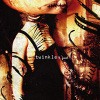 This duo issue their first album ("The Toy" in English) two years after their Audiotrauma Processing Industry EP, in a joint release between that label and Ant-zen. Le Jouet explores the many different aspects of toys, from those that children play with to those used by adults, either in role-play or, as they claim, those "deadly weapons used like toys by grown-ups who can never negate the children they once were." The duo do this by utilizing a combination of beat styles, samples, and ambient passages together with distorted vocals and simple melodic structures, ranging across a variety of styles in the process.
This duo issue their first album ("The Toy" in English) two years after their Audiotrauma Processing Industry EP, in a joint release between that label and Ant-zen. Le Jouet explores the many different aspects of toys, from those that children play with to those used by adults, either in role-play or, as they claim, those "deadly weapons used like toys by grown-ups who can never negate the children they once were." The duo do this by utilizing a combination of beat styles, samples, and ambient passages together with distorted vocals and simple melodic structures, ranging across a variety of styles in the process.The two men responsible, Yves Cornu and J.B. Leduc, in taking all these styles have concocted a wide-ranging mix of songs. Certainly they have tried to keep moving stylistically, refusing to be constrained by any boundaries or particular genre parameters. It is all too easy these days, given the democratization of (musical) technology and the ease of access to it, for people to simply regurgitate what has gone before, then record, package and release it. Twinkle are to be commended for avoiding that trap, instead giving us a varied but solid set of thematically-linked songs. Despite that variety, there exists a coherence binding the entire album together, especially in the latter half where everything takes on a much harder edge. I heard a definite linear progression from innocence to darkness, from the inventive play of children to the 'games' of adults, with their sexual and dominatory subtetxs.
Even the military uses the term 'war-games,' which implies a form of play, a euphemism disguising the true intent of the exercise. From beginning to end there is a wonderfully subversive and sinister undertone running beneath the playful surface, especially noticeable in the first half of the album, which emphasizes the true nature of toys, play, and games, with the often hidden facets of politics and dominance. After all, this is how children learn about social interaction: lessons which are often carried through into later life, for better or worse.It is that undercurrent of subversion and deviousness that does it for me. The third track "Ton Style" is an example: initially it starts out as music-boxy but as it progresses it takes on more and more of a soiled edge until finally it ends with a dirty and distorted stutter, the song suffused with a subtle anger and malevolence. The next track, "La Victime Volontaire," is ostensibly a hip-swinging middle-eastern influenced number but perhaps it takes on a deeper and darker significance in today’s political climate; I can imagine how the sentence I used from the press-release in my introductory paragraph above could apply here.
The highlights of the album, the ultimate confluence of all the themes and ideas that form the various streams feeding into this album, are tracks eight and nine, "Le Joueur" and "Tu es Perdu" respectively, particularly the former, even though it only lasts for just under two minutes. There is something shiver-inducing about the use of a 'jolly' child-like melody coupled with speeded up samples and children singing over a distorted dance-floor workout. The following track is a full-on tribal stomp that wants to get you up and moving your feet, however reluctantly.
I haven't listened to rhythmic industrial since Frontline Assembly's Millennium, feeling at the time that the genre had run out of both steam and originality. On hearing this offering though I have come to realize though that I may have a bit premature in my assessment. Certainly I have heard considerably worse.
samples:
Read More

